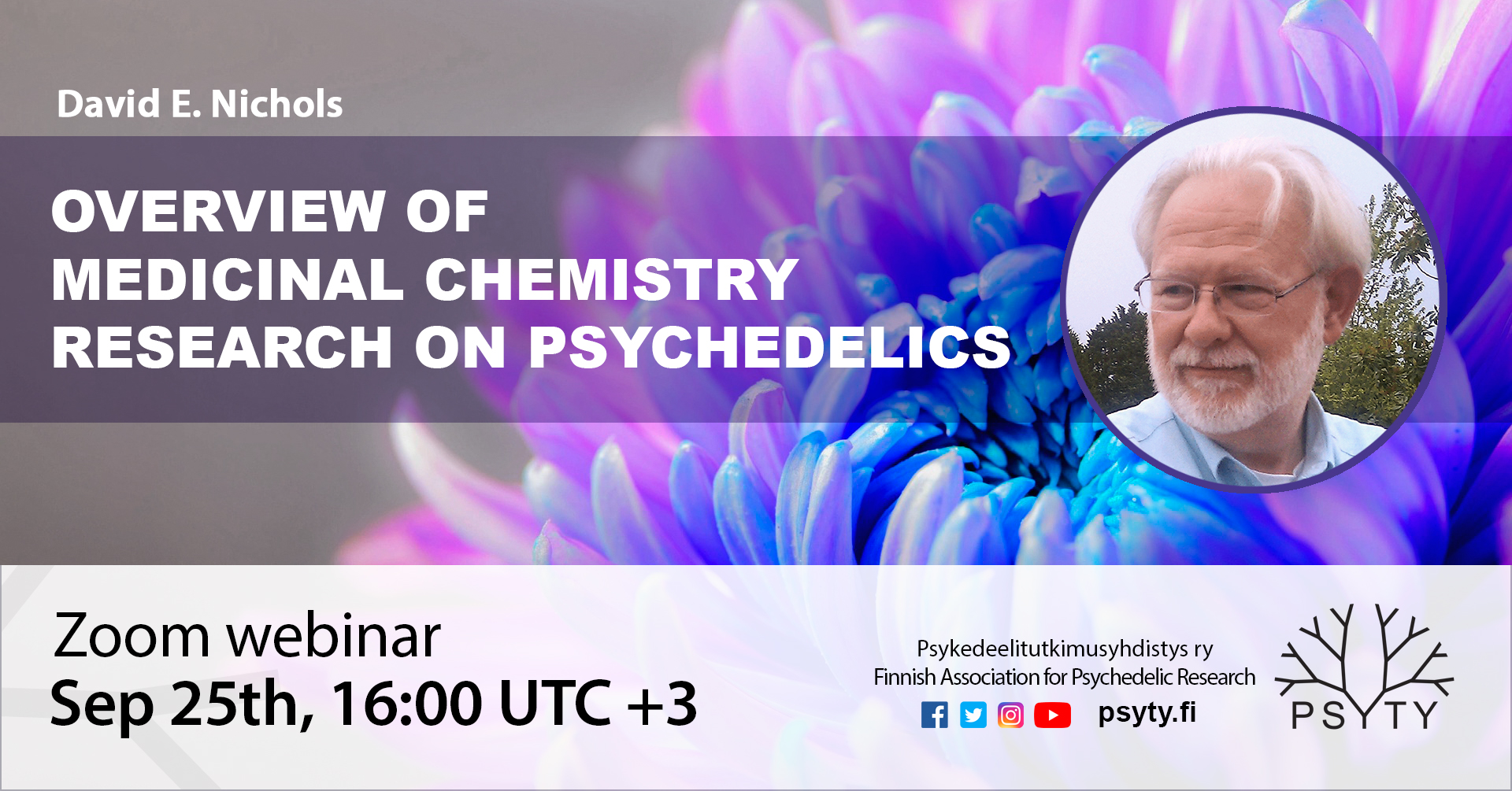Zoom webinar Sept 25th 2021. David E. Nichols: Overview of Medicinal Chemistry Research on Psychedelics

When psychedelics were criminalized at the turn of the 1970s, most research on them also came to a halt. Yet, some avenues of study still remained open. Veteran of psychedelic research, pharmacologist and chemist David E. Nichols, PhD, has been researching psychedelics since 1969 – over the course of seven decades. On Saturday, September 25th, at 4PM UTC+3, Nichols will present a webinar lecture organized by Psykedeelitutkimusyhdistys ry (Finnish Association for Psychedelic Research). The lecture offers a rich overview of psychedelics with an emphasis in medicinal chemistry. Topics covered include:
- History of the use of psychedelics, reaching back millenia
- Research conducted by the Heffter Research Institute, founded by the speaker in 1993
- How psychedelics are tested in animals
- The role and functions of the serotonin receptors central to the action of classic psychedelics
- Research on LSD analogues – as an example, how different conformations of the molecule affect the kinetics of LSD binding to the receptor
- The effects of psychedelics on brain dynamics as a possible mechanism for their therapeutic potential
The session will help get a better grasp of the growing interest in the broad field of psychedelic research. The lecture provides non-technical information accessible to the general public, but will also delve deeper into chemical and pharmacological details. The event includes a presentation and discussion with questions from the audience.
Tickets are available in two categories: 10 € (full price) and 5 € (students / low income participants) in our web store.
For members of the association who’ve paid their membership fee for 2021, the event is free of charge. If you want to pay your membership fee for this year or become a member, you’ll find our membership items in our web store: https://holvi.com/shop/psyty. An email with a link for free registration has been sent to members of the association. If you’re not sure if you’ve paid for your membership this year, feel free to ask us!
In case you might want to mark your calendar, our next international webinar with psychiatrist and psychotherapist Peter Gasser is scheduled for November 11th.
Information on David E. Nichols
David E. Nichols, PhD is currently an Adjunct Professor in the Eshelman School of Pharmacy at the University of North Carolina, Chapel Hill, NC. He is a Distinguished Professor Emeritus at the Purdue University College of Pharmacy and was the Robert C. and Charlotte P. Anderson Distinguished Chair in Pharmacology, where he carried out teaching and research for 38 years prior to his retirement in 2012. In 2004 he was named the Irvine H. Page Lecturer by the International Society for Serotonin Research, he received the first Purdue Provost’s Outstanding Graduate Mentor award in 2006, and was named a Distinguished Alumnus by the University of Iowa College of Pharmacy in 2012.
He began studying psychedelics in 1969 while a graduate student and continued that research throughout his entire professional career, being one of only a few investigators able to research psychedelics after they were scheduled. In 1993 he founded the Heffter Research Institute (HRI), which funded the first rigorous clinical studies of psychedelics in humans after a nearly 40-year moratorium and served as its president for more than 25 years. HRI funded the groundbreaking Phase I and II studies of psilocybin for the treatment of depression, as well as substance use disorders.
Dr. Nichols also synthesized the DMT used by Dr. Rick Strassman in his human studies, the MDMA that MAPS used for their Phase I and II clinical trials for PTSD, and the psilocybin used by several investigators for human clinical studies including the Phase I and II trials conducted at Johns Hopkins University by Roland Griffiths and his colleagues. He is considered the world’s leading expert on the chemistry of psychedelics. Dr. Nichols, although officially retired, remains active in the field through consulting and collaborations with several academic and pharmaceutical organizations and continues to publish scientific papers.

Comments are Disabled